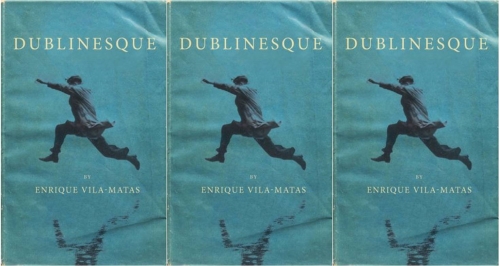I first came across Enrique Vila-Matas, whose book Dublinesque drops stateside today, on a cold snowy morning in the Midwest. School was canceled. Work was canceled. And at the top of my pile of books to read wasn't something by Enrique Vila-Matas. Instead, it was a gorgeous Melville House edition of Bartleby the Scrivener.
My back to the frozen world outside, I paged through the story of a man himself frozen in repeating a perpetual, unalterable phrase: “I would prefer not to.” The idea of a man who had moved beyond logic and reason made me shiver in the heat of the fireplace.
What could I read after a such a chillingly final story? I looked down the pile, and my eyes lit on an unlikely title: Bartleby & Co. As far as I could tell, this was the story of a man who had decided to investigate the "writers of the No." Less a novel and more a disembodied set of footnotes, Bartleby & Co. trawls across the literary landscape of figures who, like Bartleby, have gone silent. I read the narrator's skewed commentary on Salinger, and also on Alfau, Derain, Rimbaud, Celan...
So this was who you could read after being overwhelmed by the morass of Modernity, I thought. I looked at the spine. Enrique Vila-Matas. This was the author who found something new and interesting to say about these fragments we have shored against our ruins. How had none of my friends told me about this wildly popular Spanish author, churning out new books about literary sicknesses? (I couldn't even remember how that book had gotten in my room.) I ordered Montano’s Malady immediately, and then waited eagerly for the English translation of Dublinesque.
Dublinesque doesn’t disappoint. In it, publisher Samuel Riba—“he likes to see himself as the last publisher,” Vila-Matas writes—sets out for Dublin to orchestrate a funeral for the printed book, for great authors and the entire “Gutenberg galaxy.” Literature has no plans to die, of course, so the trip becomes a rather complicated affair.
The story takes place chiefly in Dublin and under the aegis of Joyce’sUlysses, but it’s no surprise when John Huston’s interpretation of “The Dead” is mentioned, or when a man strongly resembling Samuel Beckett appears. Still, the author reminds us that Riba “also took up publishing because he’s always been an impassioned reader.” And as Riba is a recovering alcoholic, it may well be that literature is a different sort of addiction for him. If this hall of mirrors, in which every book Riba (or, for that matter, Vila-Matas) has read is reflected back at the reader, seems overwhelming at first, how much more alluring it must seem to the seasoned reader, who will immediately catch the reference to Paddy Dignam or El Jabato.
No book exists in a vacuum, but Vila-Matas’s books are exceptional in their dependence on all other great books to validate their own existence. For people who (like me) don't have doctoral degrees in the humanities, it's a relief to know that there's a rather enjoyable storyline, and a great deal of wit to boot. Still, I can’t imagine anybody liking Dublinesque without having already read Ulysses and most everything else in the Modernist canon—but after Ulysses, Vila-Matas’s Dublinesque seems like one of the few twenty-first-century books worth reading.
image credit: ndbooks.com





 A Black Balloon Publication ©
A Black Balloon Publication ©